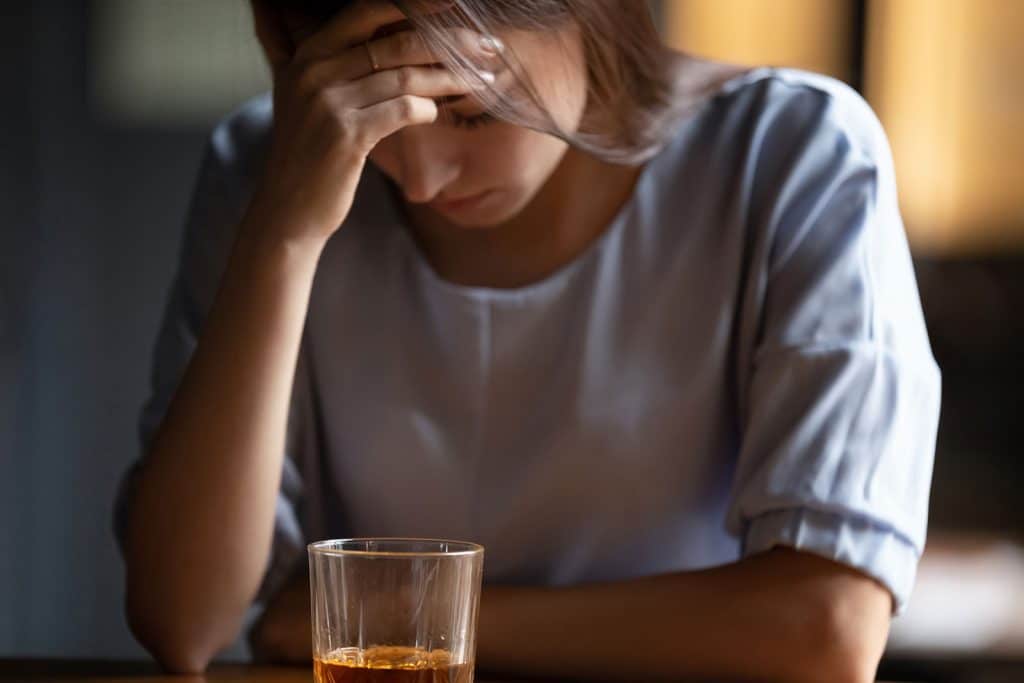In 2020, excessive drinking rose by nearly 40% across all demographic groups due to the effects of the pandemic.[1] Alcohol addiction accounted for 32% of substance addiction treatment facility admissions in New Jersey in 2020.[2] It ranked second on a list of the state’s most common substance use disorders for the same year. To overcome addiction to alcohol, an alcoholism treatment program, which is a type of treatment, is essential.
Table of Contents
Understanding Alcoholism and Alcohol Use Disorder
Alcoholism typically refers to alcohol addiction. However, people often use the term interchangeably to refer to binge drinking, addiction, and alcohol use disorder. As a result, there is some confusion. Binge drinking is excessive drinking but not addiction. Although it can lead to alcohol use disorder, not all binge drinkers have AUD. Alcohol use disorder happens when excessive drinking causes harm.[3] Severe AUD may be called alcoholism.

When a person drinks so much that they experience withdrawal when alcohol is not available, that is called dependence.[4] It often leads to addiction, which happens when a person develops a brain disease that interferes with normal functions.[5] As a result, the individual cannot stop drinking even if the person is aware of the negative effects of the addiction. An alcoholism treatment program provides the high level of help an addicted individual needs to stop drinking.
Causes of Alcohol Use Disorder and Addiction
There are many potential reasons for developing an alcohol use disorder or addiction.[6] These are some common contributing factors:
- Starting at an early age
- Drinking more over time
- Genetics
- Social or economic environment
- Mental health issues
Effects of Alcoholism
Alcohol addiction can have devastating effects on individuals and those around them. It can also have adverse effects on the public, such as when people who drive while intoxicated cause accidents. There are long-term and short-term effects for the individual who struggles with addiction.
Long-Term Effects
Many of the long-term effects of alcohol addiction are permanent or difficult to reverse.[6] These are some potential long-term effects:
- Heart problems
- Liver disease
- Menstrual irregularity
- Digestive issues
- Diabetic complications
- Male sexual dysfunction
- Vision problems
Short-Term Effects
The short-term effects of an alcohol use disorder or addiction can be similar.[7] These are some common effects:
- Loss of coordination
- Slurred or incoherent speech
- Drowsiness
- Vomiting
- Headache
- Distorted senses
- Memory lapses
Signs of Alcoholism in a Loved One
In many cases, family, friends, and coworkers of people with alcohol use disorders can identify some of the signs. People often change, and putting all the pieces of the puzzle together may take a little while. In addition to mood swings and secretive behavior, there may be other warning signs.[8] These are some examples:
- The person is always hungover or drunk.
- All the person talks or thinks about is alcohol.
- The individual is withdrawn from social activities, school, work, or other life commitments.
- The person frequently seems to experience withdrawal symptoms.

People may have new financial or legal troubles as well. Financial problems often relate to the person spending more on alcohol, missing work, or other alcohol-related reasons. Legal troubles can happen when a person gets a DUI or commits another crime or violation because of alcohol misuse.
Self-Assessment for Alcohol Substance Use Disorder
People, mostly adolescents and young adults, as what the National Institute on Alcohol Abuse and Alcoholism and Substance Abuse and Mental Health Services Administration (SAMHSA)said, wonder if they have a drinking problem, they are trying to understand how to tell if it is time to get substance use treatment or alcohol addiction treatment. There are plenty of self-assessment tools online. As a rule, if a person cannot stop drinking, it is crucial to seek help. That is a key sign of addiction. Making major life changes, losing money, or experiencing other forms of harm because of alcohol consumption are all signs that it is time to seek help. Those are also common signs of an alcohol use disorder or addiction.
Treatment for Alcoholism
Although addiction happens when people cannot stop drinking on their own, it does not mean stopping is impossible. With guidance and peer support groups, it is possible to stop. Some people relapse once or relapse multiple times, but they can start over on the path to sobriety with treatment. For a treatment plan to be effective, it should be comprehensive, and it must be approached correctly. Without the advice, support, and supervision of health professionals, it is harder to stay in recovery. There are several forms of treatment for alcoholism that are effective.[9] These are some examples of what an alcoholism treatment program may include.
Detox
This is the most crucial step of treatment. Without detoxing, it is impossible to get sober and stay in recovery. Detox is the body’s natural way of getting rid of harmful substances. Alcohol detoxification should never be completed without medical guidance or supervision. Some people can experience seizures during withdrawal, which can be dangerous. Also, the other symptoms of withdrawal can be unpleasant. Medical professionals can provide medications and other assistive therapies to ease symptoms. Also, the risk of relapsing can be higher when a person withdraws without supervision.

Rehab
Rehab is a term that often includes multiple therapy structures and types. The proper structure depends on a person’s abilities and needs. Some people need intensive outpatient care or partial hospitalization, which are more intense structures that involve longer and more frequent therapy sessions. Several helpful therapy structures support recovery, well-being, social function, and healing. These are some examples:
- Group therapy
- Adventure therapy
- Cognitive-behavioral therapy
- 12-step programs
- Individual counseling
Group therapy and 12-step programs help people learn how to support others, articulate their needs, and share their struggles. Adventure therapy and other supportive therapies promote well-being and help people develop healthy ways to express themselves. CBT and individual therapy are useful for discovering triggers, behavior causes, and strategies for positive changes.
Recovery
Part of staying in recovery is attending 12-step meetings. Some people may also need ongoing counseling. Since a treatment program introduces people to counseling and 12-step programs, it is easier to become comfortable with therapy and interacting with others. Recovery is a lifelong journey, but a professional treatment program equips people with the keys to beating addiction and overcoming their struggles.
Dual Diagnosis Treatment
In 2020, more than 60% of people admitted to treatment facilities in New Jersey had a co-occurring mental health disorder.[2] People who have a co-occurring mental health disorder and alcohol use disorder need treatment for both issues. Treatment facilities provide simultaneous treatment for both disorders to maximize the chances of staying in recovery.
AUD often stems from an untreated mental health disorder, and people tend to try to self-treat emotional pain with alcohol. If the underlying disorder is not treated, its effects will persist and increase the relapse chance. A good treatment facility offers dual diagnosis treatment to address all issues properly.
Professional Alcoholism Treatment Program in New Jersey
If you or a loved one is struggling with alcohol addiction or misuse, our facility is here to help. Garden State Treatment Center, an addiction treatment center, is located in Sparta and welcomes residents from nearby areas. Our rehab center offer intensive outpatient program, partial hospitalization, outpatient treatment, dual diagnosis for mental health issues, behavioral health, aftercare health care, and other treatment programs (levels of care). Also, we use multiple therapeutic approaches in our alcohol treatment center. Our team has accredited professionals who are here to help you or your loved one or family members start the recovery journey from drinking alcohol, alcohol dependence, and other alcohol problems, even opioid cravings. We help people discover the keys to beating the cycle of addiction. To learn more about our alcoholism treatment program, drug addiction treatment, and other alcohol rehab programs in New Jersey, please get in touch with us.
Related Articles
- Stimulants
- Alcohol
- Dual Diagnosis
- Opioids
- Marijuana
- Kratom
- Heroin
- Cocaine
- Benzodiazepine
- Relapse Prevention
- Co-Occurring Disorders
- Alcoholism
- Drug Addiction Treatment
- Medication Assisted Treatment
- 12-Step Program
References
- [1] https://www.nj.com/coronavirus/2021/08/pandemic-drinking-soars-among-blacks-hispanics-women-with-young-children-study-says.html
- [2] https://www.nj.gov/humanservices/dmhas/publications/statistical/Substance%20Abuse%20Overview/2020/Statewide.pdf
- [3] https://medlineplus.gov/alcoholusedisorderaud.html
- [4] https://www.cdc.gov/media/releases/2014/p1120-excessive-driniking.html
- [5] https://www.asam.org/quality-care/definition-of-addiction
- [6] https://www.mayoclinic.org/diseases-conditions/alcohol-use-disorder/symptoms-causes/syc-20369243
- [7] https://www.medicalnewstoday.com/articles/305062#short-term-effects-
- [8] https://www.webmd.com/connect-to-care/addiction-treatment-recovery/alcohol/how-to-tell-if-a-loved-one-is-an-alcoholic
- [9] https://alcoholtreatment.niaaa.nih.gov/what-to-know/types-of-alcohol-treatment



